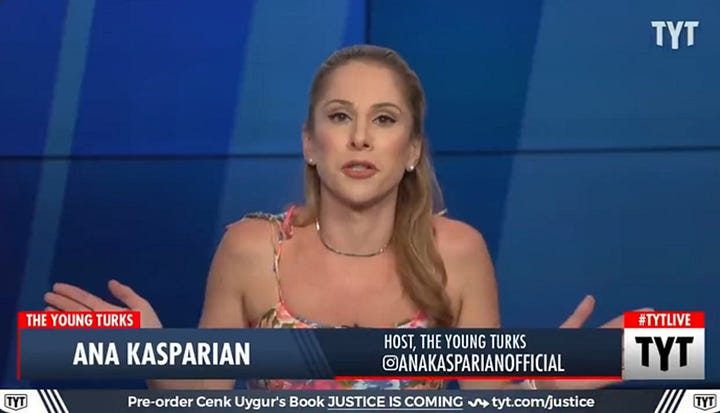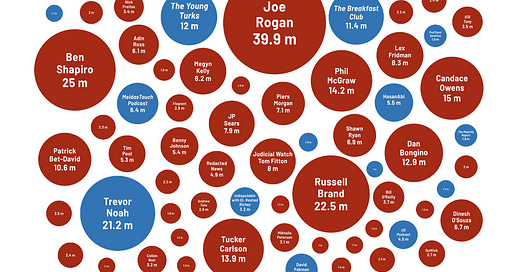Not A Messaging Crisis, But A Media Crisis
Liberals And Democrats Lack The New Media Venues To Reach Voters
Media Matters, the progressive media watchdog, released an eye-opening report this week that focused on right-wing dominance of online media. From the study, Media Matters’ CEO Angelo Carusone concluded something that I’ve been saying for a while: the problem with the Democratic Party and the left-of-center political coalition in America is not the message, as is always blamed, but the media ecosystem that stymies any compelling message.
The online media ecosystem, especially podcasts, has become the dominant source of information this decade. However, that world is dominated by the right. Last week, Media Matters published a chart, shown above, showing the most popular online information programs. The larger the bubble, the more listeners or viewers the program has. Red bubbles are considered right-wing-dominated shows, while blue bubbles are more left-wing.
The chart shows nine out of ten top online shows are right-wing. They include Joe Rogan’s The Joe Rogan Experience podcast, the most listened-to podcast in the world, and videos and lectures by Jordan Peterson, who gained popularity after coming out against a Canadian law that would ban discrimination against transgender and nonbinary people. Following them are right-wing media figures Ben Shapiro, Tucker Carlson, Dan Bongino, Charlie Kirk, Candace Owens, Phil McGraw, Nelk Boys’s podcast Full Send, and comedian Theo Von.
The top Democratic-leaning online show – and the only one in the top 10 – is Trevor Noah, the former host of The Daily Show, whose podcast What Now? With Trevor Noah is more focused on culture than domestic politics and often delves into race and identity issues, something that has hampered the Democratic Party and liberalism in general this decade. The next biggest audience goes to The Young Turks, the controversial podcast hosted by Cenk Ugyur, who has recently been palling around with Trump supporters at the Conservative Political Action Conference, and Ana Kasparian, who has made waves recently for leaving the Democratic Party because they haven’t been tough enough on homelessness and urban disorder – despite being supportive of the criminal justice measures that lead to that issue just a half-decade ago. Still, both rank way below the top right-wing podcasts, and The Young Turks has less listenership than ten right-wing shows.
It is not helpful to the Democratic Party or the progressive movement if one of their top messaging apparatus online is a show like The Young Turks that regularly criticizes the Democratic Party for being too left-wing or too centrist, depending on the whims of its hosts. Ranking further down the list for Democrats is Charlamagne Tha God’s The Breakfast Club podcast, which, like Noah’s, only really touches politics when the Democrats do something that pisses off the hosts, specifically on identity issues. Behind them is Hasan Piker’s HasanAbi podcast. Piker, the nephew of The Young Turks’ Ugyur, has caused controversy for suggesting the assassination of a Republican senator, praising the Houthis, the Islamic radical group in control of Yemen, and saying it “doesn’t matter” to him if Hamas committed acts of sexual violence against Israelis during the terror attacks of October 7th, 2023.
The fact that the only left-leaning podcasters are ones who regularly criticize the main left-of-center party or are content creators who often say or do politically and socially toxic things hobbles the Democratic Party and the whole left-of-center coalition in the United States. You don’t hear this same type of critiquing of the Republican Party under Trump, even if they stray from orthodox right-wing views as Trump did with abortion during the general election. If Trump says jump, the right-wing media ecosystem tells people to jump. If he says sit, everyone is told to sit. There is no questioning or critiquing. Meanwhile, the Democratic Party and the left-of-center movement have no similarly reliable allies in new media.
For example, what would have happened if Senate Democrats had decided to filibuster the budget resolution in the Senate last week, triggering a government shutdown, as many leftists and liberals wanted? If the shutdown happened and Republicans dug in their heels, as was likely to happen, Democrats would argue that Republicans are responsible for not negotiating with Democrats to ensure Congress drafts a budget resolution that can get 60 votes in the Senate. How would that play out in new media? Well, likely, all the red dots in the chart above would say it's the fault of the Democrats for not voting for cloture. Meanwhile, assuming they touch the issue, all the blue dots would say it's the Democrats’ fault for not voting for cloture without a plan to get Republicans to give in to their demands. In both cases, Democrats bear the blame for the shutdown, and Trump and Republicans skate responsibility. Democrats know this, and it was no doubt one of the factors that led Senate Minority Leader Chuck Schumer (D-New York) to forgo a filibuster and allow the budget resolution to pass, avoiding a shutdown.


It’s not enough that Democrats have a message; they must have a media apparatus that champions its causes and successes. Can they do that?
No, probably not.
In the 2000s, Democrats tried to fight the right in the talk radio world dominated by the right at the time. They failed. Their flagship attempt, Air America, floundered because it couldn’t attract listeners. While it trod water as one of the go-to places for anti-Bush resistance in the mid-2000s, it went off the air after six years in the second year of Obama’s presidency. A second attempt on satellite radio, Sirius Left, also failed.
The reason is simple: There is no sustainable constituency for a left-wing media ecosystem because there is no consensus on the direction the Democratic Party should take and no agreement to get behind whichever side wins that debate the way Republicans submitted to Trump. In a recent CNN poll, the same number of moderates and progressives said they had an unfavorable view of the Democratic Party. However, about half of moderates thought the Democratic Party should work with Republicans, while only about 1 in 5 progressives thought the same.
The bloc of potential listeners willing to sit all day and listen to broadcasters echoing a liberal pro-Democratic Party point of view is too small. Evidence shows it may only work when there is an unpopular Republican government in office, as was the case in the later Bush years in the 2000s. Still, eventually, leftists will get turned off by the moderates and the moderates by the leftists. There is no consensus on messaging or strategy the way there is on the right.
The left-leaning coalition will never approve of anything the Democratic Party does because the core of their ideology is anti-establishment. Even when the establishment does what it wants, as Biden did with the withdrawal from Afghanistan, student loan forgiveness, aggressive anti-trust enforcement measures, and pro-union policies, it can’t be enough or is overshadowed by something he didn’t do or did wrong. That’s because Biden, by nature of being the establishment, can not succeed.
For example, states with universal healthcare coverage, like New York, Massachusetts, or Kentucky, can never be championed because they achieved it within the system, without “socialism” or “single-payer,” which is the only way the left believes it can be achieved. The left-wing movement’s survival relies on the idea that Democrats are persistent failures, and the movement’s survival depends on the media apparatus focusing on those failures.
For moderates and independents, the core of their ideology is being “nonpartisan,” “independent,” and “open-minded.” Therefore, they will never be attracted to purely partisan media. For them, any media program biased toward Democrats is just as bad as the Joe Rogans, Theo Vons, and Ben Shapiro. They don’t want to hear why Democrats are good and Republicans bad; they want a more nuanced analysis. Moderates want more intellectually curious media and are open to listening to the other side, which is why shows like Real Time With Bill Maher are popular with them despite also being openly critical of Democrats often. Moderates also value how conservatives view them and will go out of their way to find reasons to criticize Democrats and liberals to retain their “independent” and “nonpartisan” reputation. Progressive podcasters who dabble in controversial left-wing ideas, like Trevor Noah and Hasan Piker, give them plenty to use against Democrats and the left.
That leaves a tiny potential audience for media that unapologetically champions the Democratic Party and the left-of-center movement.
There is no sustainable constituency for a left-wing media ecosystem because there is no consensus on the direction the Democratic Party should take and no agreement to get behind whichever side wins that debate the way Republicans submitted to Trump.
On the right, there is a much bigger need for unity. The rise of the online right-wing programs came as a response to the broad perception that traditional media – television news besides Fox and newspapers besides those in Murdoch’s empire – are liberal mouthpieces whose dominance in the public information sphere drowns out right-wing voices and are primarily responsible for the rise of left-wing politics in the mid 20th Century. While it’s debatable whether or not this is true or just a right-wing invention meant to excuse away their cultural inferiority during the New Deal, Civil Rights, Bill Clinton, and Barack Obama eras, at least half the country believes it. Right-wing media outlets made it a big part of their marketing strategy, and it worked – most recently during and after the COVID-19 Pandemic when much of the public felt contrarian voices, almost exclusively on the right, were being silenced or suppressed by traditional media in favor of a narrative focusing on consensus. Cancel culture also drove people toward alternative media, such as Peterson and Rogan, who were willing to criticize cancel culture, ignore it, and validate what people were afraid to say or even think.
Everyone on the right, from the independent center-right moderates to the far-right conservatives, are on the same page: beat the liberals. Being a conservative gives you a natural sense of fear, as the tide of time is moving against you, making you more likely to want to close ranks and put aside differences to unify on a common goal.
For liberals, there is a sense that, as former President Barack Obama said often, the arc of the universe is long but bends toward justice. Eventually, the world will move in your direction, so there’s a smaller sense of urgency to close ranks. Progressives and moderates often believe letting conservatives win is better than ceding power to the other faction of the coalition. That’s why moderates frequently vote Republican to send a message to the Democrats to moderate, and progressives sometimes endorse the concept, as actress and activist Susan Sarandon did in 2016, of “accelerationism,” allowing the right to win to make things worse to push people farther left in response. Of course, this doesn’t work, but it’s the only play the left has.
That makes it harder to formulate a unified message and get everyone on the same page to market it when they do.






The other issue is that voters—rightly or wrongly—have different expectations of the parties (especially in the Trump era). Republicans are expected to break stuff, fling poo, and throw hissy fits, while Democrats are expected to "be the adults in the room" and govern—even when they hold no actual power.
Voters punished Democrats in the 2011/12 Wisconsin recall elections because they didn't "stay and fight" during the passage of Scott Walker's union-busting legislation—even though fleeing the state was literally the *only* tool that Democrats could use to slow the process. And that's just one maddening example.
Another issue is that audio media (such as podcasts or talk radio) are disproportionately popular with people who spend a lot of time behind a steering wheel, and those people are more likely to be attracted to right-wing politics due to anti-environmentalist resentments and the zero-sum competition for road and parking space.